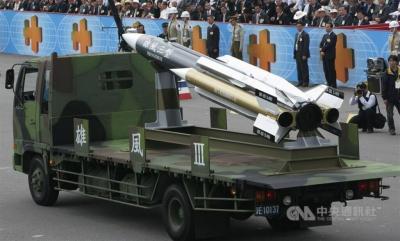Prosecutors yesterday filed attempted murder charges against a New Taipei City man accused of stabbing three nurses at the city’s Shuang Ho Hospital where he was quarantined for COVID-19.
The New Taipei City District Prosecutors’ Office in a news release cited the wounds the man surnamed Hung (洪) allegedly inflicted as evidence of his intent to kill and indifference to human life.
Prosecutors are also asking the court to indict the man on charges of assault, aggravated assault and obstructing the Medical Care Act (醫療法), the office said.
Hung was admitted to the hospital’s COVID-19 quarantine facility on May 25, three days after feeling weak and testing positive for the virus, it said.
On Monday morning last week, he left quarantine without authorization before being confronted by two nurses surnamed Tsai (蔡) and Chen (陳), who compelled him to return to the quarantine area, the office said.
Later, Hung hid a fruit knife behind his back and went to the hospital’s solarium, where he approached a nurse surnamed Shih (施) and asked her for directions to leave the facility, it said.
When Shih refused, Hung allegedly stabbed her in the chest and back until she retreated to a hospital corridor crying for help, the office said.
When Tsai and Chen came to investigate, Hung allegedly attacked them. Tsai dodged a thrust that glanced across her abdomen before helping Shih to escape, but Hung allegedly cornered Chen and repeatedly stabbed her in the chest and the groin, it said.
After the police subdued Hung, he spat at medical staff, the office added.
Shih’s life-threatening injuries included a collapsed left lung. The nerves and tendons in Chen’s right hand were severed while she was defending herself, and she had other non-life-threatening injuries.
The New Taipei City District Court has been asked to impose a heavy sentence due to the viciousness of the attack and the need to deter such actions during COVID-19, the office said.

STATS: Taiwan’s average life expectancy of 80.77 years was lower than that of Japan, Singapore and South Korea, but higher than in China, Malaysia and Indonesia Taiwan’s average life expectancy last year increased to 80.77 years, but was still not back to its pre-COVID-19 pandemic peak of 81.32 years in 2020, the Ministry of the Interior said yesterday. The average life expectancy last year increased the 0.54 years from 2023, the ministry said in a statement. For men and women, the average life expectancy last year was 77.42 years and 84.30 years respectively, up 0.48 years and 0.56 years from the previous year. Taiwan’s average life expectancy peaked at 81.32 years in 2020, as the nation was relatively unaffected by the pandemic that year. The metric

Taiwan High Speed Rail Corp. (THSRC) plans to ease strained capacity during peak hours by introducing new fare rules restricting passengers traveling without reserved seats in 2026, company Chairman Shih Che (史哲) said Wednesday. THSRC needs to tackle its capacity issue because there have been several occasions where passengers holding tickets with reserved seats did not make it onto their train in stations packed with individuals traveling without a reserved seat, Shih told reporters in a joint interview in Taipei. Non-reserved seats allow travelers maximum flexibility, but it has led to issues relating to quality of service and safety concerns, especially during

A magnitude 5.1 earthquake struck Chiayi County at 4:37pm today, the Central Weather Administration (CWA) said. The hypocenter was 36.3km southeast of Chiayi County Hall at a depth of 10.4km, CWA data showed. There were no immediate reports of damage resulting from the quake. The intensity of the quake, which gauges the actual effect of a seismic event, measured 4 in Chiayi County, Tainan and Kaohsiung on Taiwan's seven-tier intensity scale, the data showed. The quake had an intensity of 3 in Chiayi City and Yunlin County, while it was measured as 2 in Pingtung, Taitung, Hualien, Changhua, Nantou and Penghu counties, the data

The Supreme Court today rejected an appeal filed by former Air Force officer Shih Chun-cheng (史濬程), convicted of Chinese Communist Party (CCP) espionage, finalizing his sentence at two years and two months for contravening the National Security Act (國家安全法). His other ruling, a ten-month sentence for an additional contravention, was meanwhile overturned and sent to the Taichung branch of the High Court for retrial, the Supreme Court said today. Prosecutors have been notified as Shih is considered a flight risk. Shih was recruited by Chinese Communist Party (CCP) intelligence officials after his retirement in 2008 and appointed as a supervisor